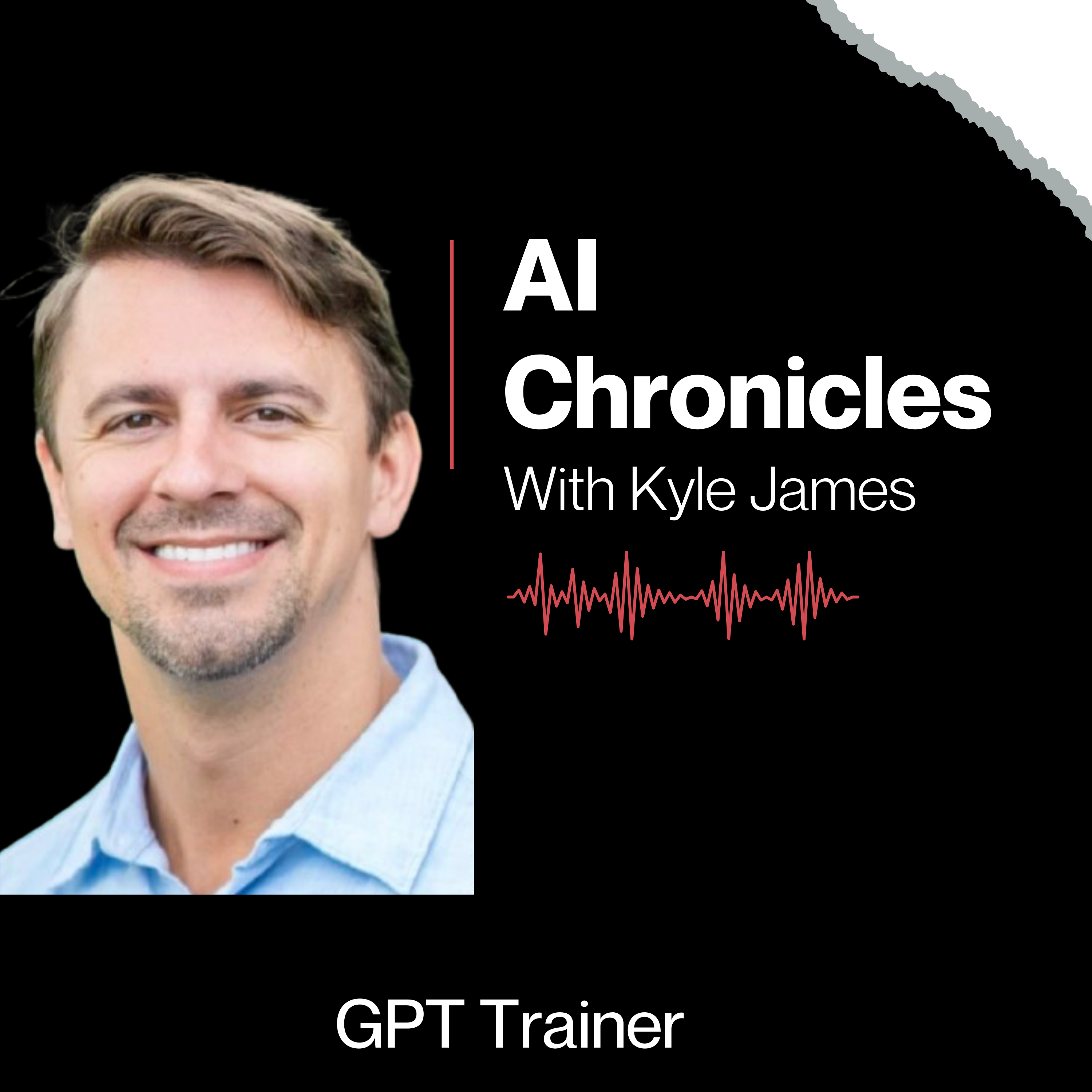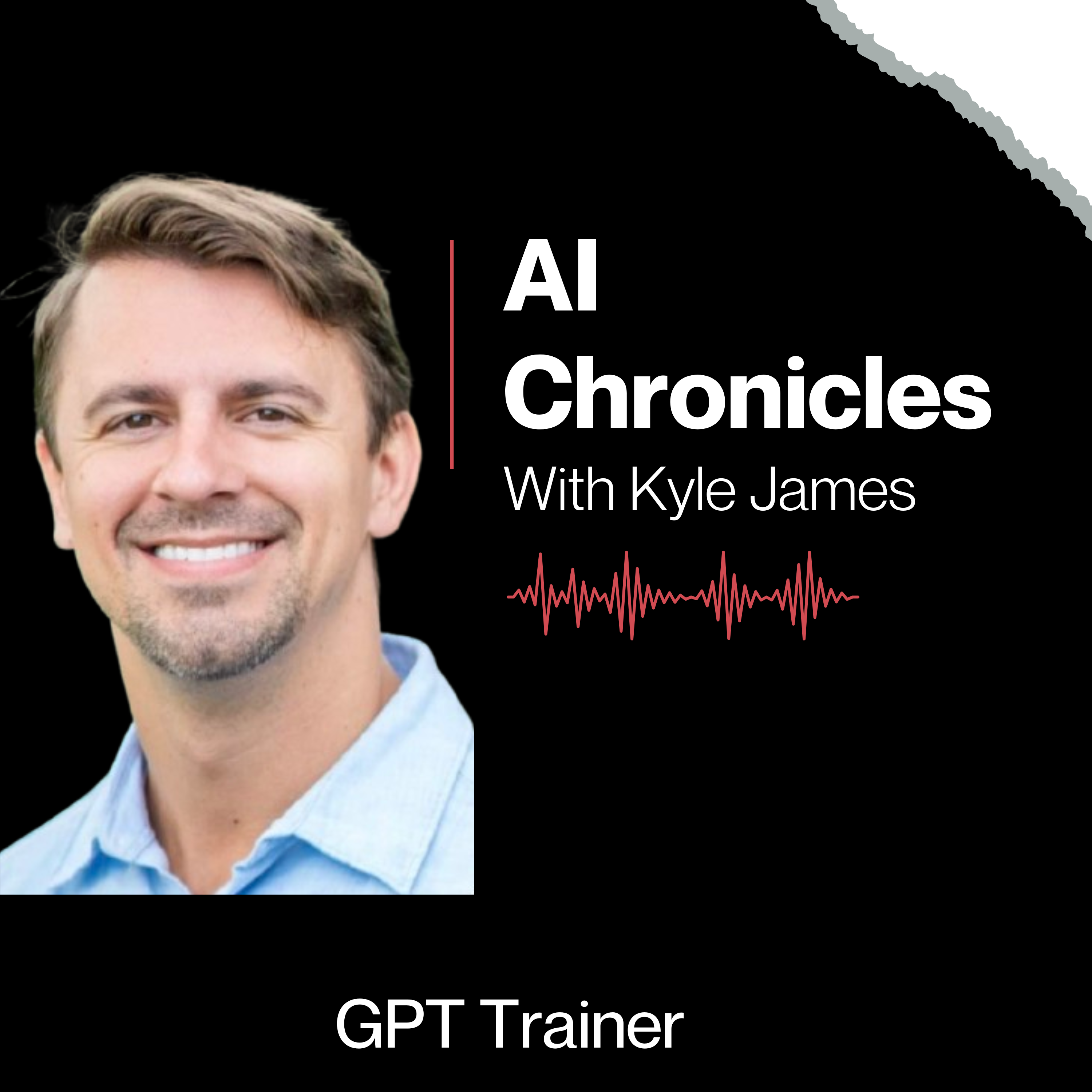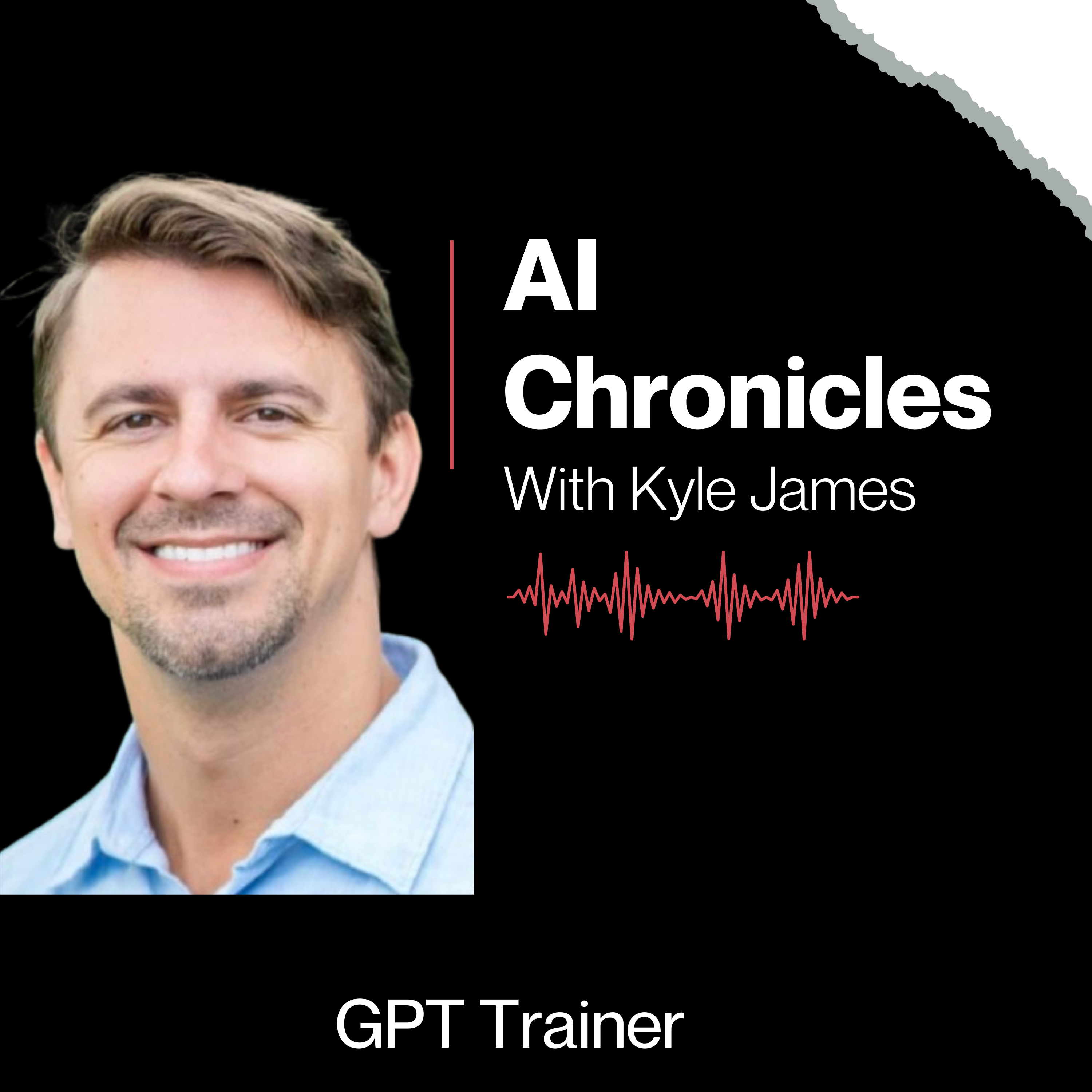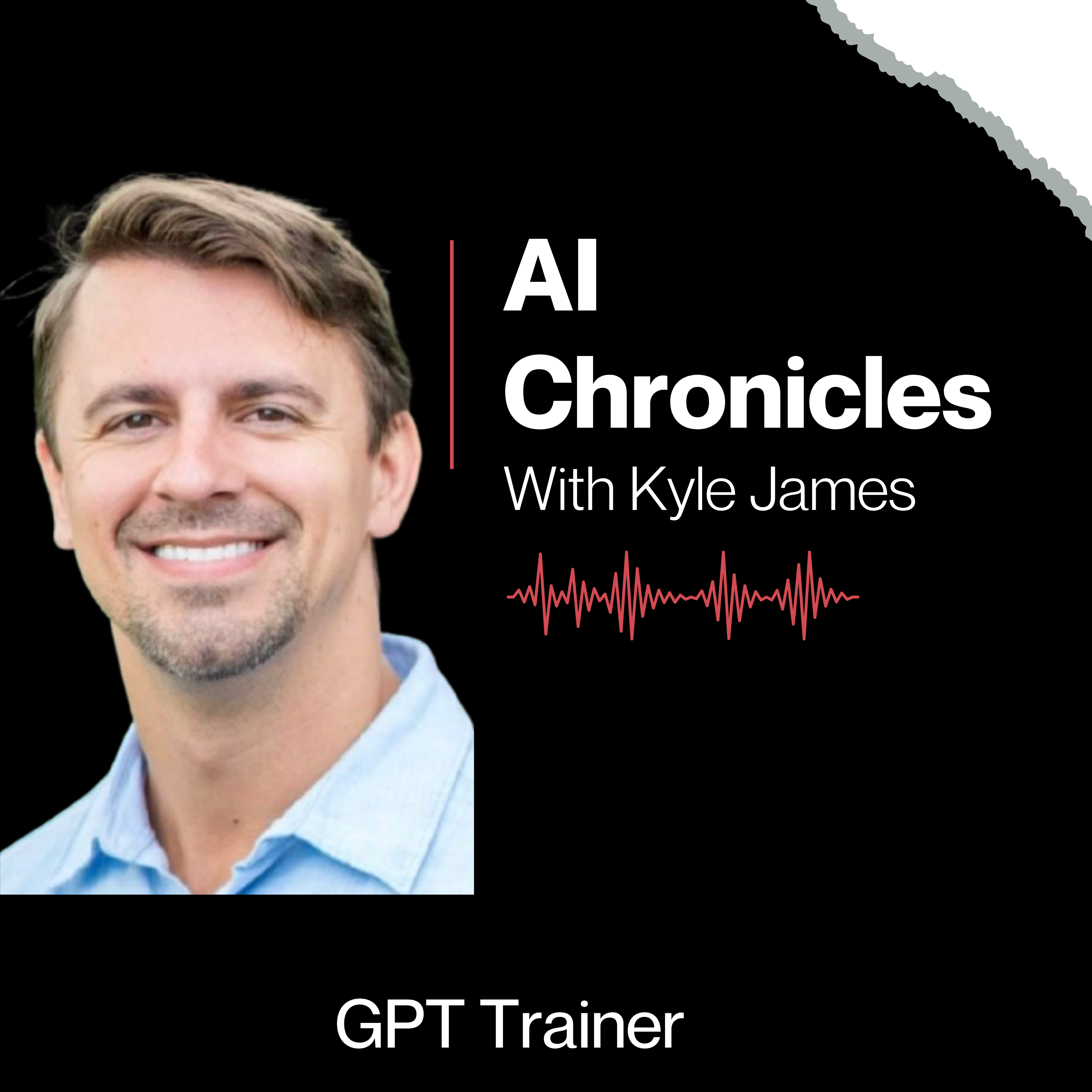Episode Transcript
Kyle James (00:00.93)
Hey, welcome to the AI Chronicles podcast. I'm your host, Kyle James. And today we'll be talking about how an entertainment company called WeEdition is using AI inside of their own business. And we'll share the exact steps that you can take in order to implement AI for yourself. Now, before I dive into that, listen closely. Are you looking to implement AI inside of your own company? Or maybe just struggling to get your AI to stop hallucinating? Speak to GPT Trainer. GPT Trainer literally
builds out and manages your AI for you, eliminating hallucinations for good. Go to gpt-trainer.com. I promise you, it'll be the biggest time saving decision that you've made all year. Trying to set up AI on your own is like trying to build a house from scratch. Sure, you could do it, but the time and frustration it's going to take you to it finished, it may not be worth it. It's a thousand times faster and safer to hire professionals. Schedule your consultation today.
Once again, that's gpt-trainer.com. Today I have with me on the show Darren Darnborough, who is an actor and the co-founder of WeEdition, which is a cutting edge digital platform that transforms the casting and audition process for actors and casting professionals. Excited to have this conversation. Hey, Darren, welcome to the show. How are you doing?
Darren Darnborough (01:21.165)
Hey Carl, how you doing? Thanks for having me on.
Kyle James (01:23.182)
Yeah, man, for sure. So give us some context here. Tell us a little bit about WeEdition. How did you find the company? And what exactly do you all do?
Darren Darnborough (01:30.457)
Well, so we audition, just celebrated our 10 year anniversary, which was amazing. We had a huge event at the Cannes Film Festival in France to celebrate that. And how I started the company, you know, is really that story of creating a product for what you need yourself. I'm an actor, my co-founders are both actors, and we hit this pain point in our audition process of finding somebody to read our audition lines with. So for anyone that's not
aware of the acting industry that clearly when you're an actor, your agent or the casting director will send you an audition, which usually consists of a few pages of the script. And traditionally you would go into an office at an appointment time and do your version of that audition. So you'd have to learn those lines, rehearse those scenes. Nowadays, and when we started, there was a little bit of this going on, but now it's almost exclusively online.
So your audition tapes are recorded at home by yourself and sent in versus us going to an appointment. But in both instances, the actor always needs someone to read opposite. So what we do at WeAudition is we are an on-demand database of actors ready to be hired to be your scene partner. And it's completely on demand any time of day or night, 24-7, like ordering an Uber, you order an actor through video chat to help you on your lines and to record what's known as a self-tape.
Kyle James (02:56.152)
Wow, that's cool. almost like on both fronts here, you have the actual cast, right? I guess I'm saying that right, the cast. And then also the actors. The cast is looking for people to bring on as actors. And then also on the flip side, where you have actors who are like, hey, I want to do a couple of lines and do a couple of presentations. Or I'm saying that wrong. know I am. A couple of lines in the script for the actors. And they can kind of.
Darren Darnborough (03:20.473)
Yeah.
Kyle James (03:25.09)
bring it together and now you can kind of, I'm almost looking like a, like I think of like soccer, like sponsorships, right? Or like, Hey, let me see your game film. And also coach going, Hey, I want to see your game film, but a soccer player wants to upload their own game film in the same case. So it's kind of like that, right?
Darren Darnborough (03:38.984)
Right. It's a little like that. So for any TV show, any film you can imagine, when they're looking for a new character, they send out what's called a breakdown and that breakdown lists the type of person they want. So it could be the age range, their, you know, are they a lawyer or they're a doctor or they're a criminal? What's their background? It's a few lines. And then they'll send out a few pages of the script. And then the actors job.
once they get the audition sent through their agent is to interpret that script, put that character on a tape and somebody else off the tape, off the screen for the audition reads all the other lines apart from your character. So what's happened as the audition process has moved out of the rooms where we used to go in, where the casting director or the producer is the other person reading with us. We're now required to do that ourselves at home.
So people are asking them parents or their girlfriend or their friend down the street. And those people aren't actors and they don't understand the scripts properly. They get bored, they get tired, they get frustrated. They might not be available. And so that was what we were solving really is, is this issue that an actor always needs another actor. And you would think that's not hard, you know, probably most actors know other actors, but I live in, in LA at the time I was living in the middle of Hollywood in an apartment building where I knew probably 20 other actors.
and still it was tough to get somebody to help you when you wanted the help. So I remember thinking if it's hard for me living in the epicenter of film, what is it like for an actor in Idaho or in the Philippines or somewhere where there's less concentration of actors?
Kyle James (05:18.83)
Yeah, it's almost like they can get that help. Almost like it's making it where, one, even on the cast side, they can branch out because now they're getting help, the actors are getting help, they're better at their script, their tonality and all the things that they need. But at the same time, the actors are even getting help and like, look, here's some feedback. Are they providing feedback along the way or is it
Darren Darnborough (05:33.495)
Yes. Yeah.
Darren Darnborough (05:41.655)
That's correct. Yeah. Yeah. So the readers on our system can provide feedback if the actor wants it. And some actors don't, they've done their work with another coach or with their own process. So sometimes they, you know, will just ask somebody to literally read the other lines. and sometimes because they're experienced professional actors, you do ask for feedback. And it can be as far as if I'm auditioning for a certain show on television, I can find an actor that's already worked on that show.
So they can give me specific information for that world or that structure of that, of how that audition will go. Cause they have a unique insight into that, that world.
Kyle James (06:08.685)
Hmm.
Kyle James (06:19.31)
Wow. That's really cool how that, like how you have that frame. There's so many avenues of like a value add for everyone that's like has their hands inside this software. And so, okay, now you're using, you're using AI right over at we addition, like love what you guys are doing. Tell me like, why did you start adding AI in the first place? And like specifically what challenges were you trying to solve with it?
Darren Darnborough (06:28.376)
Hmm.
Darren Darnborough (06:42.221)
Well, I think how we connected, Carl, was you heard an interview where I was talking about how I'm using AI as an actor myself. In the company, we aren't using AI so much as we probably could be. We're a little hesitant. Our industry has been not very warming towards AI. can say we had some strikes against it with the Actors Union.
So my company specifically has to be a little careful about what type of AI we use and what we don't. But on a day-to-day basis, absolutely I'm using AI to run my business, to make, you know, decisions or give ideas or rewrite things for me, mainly with, you know, more complex documents or if I've got something that I need to expand upon or a lot of research I'm using in that way.
just in a time-saving sense. I've, you know, trained my chat GPT to understand what our company's about, how to speak in our brand voice, and to understand really our morals and values, which is very important. So that if I do ask it to suggest a way of writing something, it writes in mine and the brand's versus just pulling stuff from the internet, which might or might not be false or true.
but then, you know, I know, know that there's instances where we, we always upgrade in the website and changing things and moving things around. I know my CTO has found it very helpful to run code based through, through there to see, you know, through, through AI systems to, you know, expedite the process of coding as well, which is, which is only beneficial for our members because it means we update features a lot quicker. And I think that's the thing that's a little misunderstood in this world is that.
You know, with a, with a small company like ours, where we do only have a couple of developers, the speed at which we can respond to the market is improved by coding quick more quickly. We can come up with ideas really quickly. So as the human side of that, we come up with these great ideas and in the, in the past years, it's been a lot longer to implement them. which can be frustrating for us and it can, you know, extends that period for the customers.
Kyle James (08:48.556)
Mm-hmm.
Darren Darnborough (09:04.629)
of, of when they are getting an, a new interesting feature delivered to them. but for me as an actor, you know, I use AI to research the jobs that I'm going for. If I'm going for a film role, you know, the audition will usually give me a few pieces of information about the production of the role that are vague at best because a lot of television and film is under NDAs these days. But what I will find out is what
Kyle James (09:09.12)
Yeah, for sure. Definitely.
Darren Darnborough (09:33.741)
the general budget of the production is, who the director is, who the producer is, who the casting director is. And with information like that, traditionally as an actor, would look those people up and I'd go through interviews and I'd, I could spend half a day understanding the tone that a director likes to work with. You know, if it's someone like Taylor Sheridan, they have a certain, from Yellowstone.
He has a certain feeling on his shows. If it's a writer like Aaron Sorkin, they are very specific about their words and their punctuality. Right. Now you can find that out by watching interviews and doing research, but if you've got one and one or two days to create a whole audition tape, any time that you can reduce that research period and get to the same place is beneficial. So I will run those names and those, that's bits of information through.
chat GPT or another AI. And it'll come out with some amazing research that's buried and right down deep that has proven to be very useful for me in auditions in understanding what this tone of this piece will be, what the genre is, how I should play the character. I'm not allowing AI to tell me how to act, but I am allowing it to give me the information for me to do my best job.
Kyle James (10:53.922)
Sure.
Kyle James (10:58.35)
Yeah, yeah. So I think you talked about like briefly, like this, it's the industry itself has been like kind of a slow and hesitant on the AI side. That's a, that's that's a big deal. Right. And like that's, we see that a lot within the education space and people cheating with AI and things like that. But like, you know, from your perspective, like you're using AI and like, you see the value add to it. Like even on like both like the casting side, the actors and the producers, like talk with me, like the vision here, like, and I'm kind of pulling your creative side.
create this out of the brain here, what could you foresee it maybe helping the most, say for actors or for producers or for outside of just the research? What do you think could really make that home run hit if AI was implemented in the media industry?
Darren Darnborough (11:44.771)
I mean, it's a tricky one, I've got to be honest, because a lot of the creative industries is hinged on the person doing the job. For instance, casting. A casting director has a unique knowledge of actors that is personal to them, because a good casting director will have seen hundreds of actors audition.
But what's out there in the public domain is only what work the actors have actually done. And so there's an argument that you could make casting more efficient by plugging in your script, seeing what kind of characters you need and them suggesting a list of actors. What would happen there is those same actors will be seen over and over again because they're pulling from what's out there in the world.
The people that already booked the jobs, they're not pulling from the information that they have known from thousands of sessions of meeting these people in person. And, know, you, if you're in the acting industry, I know hundreds, if not thousands of amazing actors that the public yet don't know. They might've done a few lines here and a few lines there. And then one of them hits and becomes a big star and all of the news when the world talks about them.
And as if there's some overnight success and you go, no, that person's been my friend for 10 years and they've done a bit in this show and a bit in that show and a little bit over here. And, and so I think that's the challenge is, is if you're going to use AI in that sense, how do you, amalgamate what are in the creative people's brains, not just what's out there publicly, but how I can see improving things for actors is in the ways that I said, you know, we,
We rely on books and coaches and interviews and YouTube videos and, you know, source material to do our job. and if we're not inherently hesitant about AI, we can do our job quicker and better. Right. So I'll go back to the idea of if an actor can truncate that period of learning.
Darren Darnborough (14:03.265)
In order to deliver a better performance. don't see how that's bad. Right. If I get a script for a movie, it's 110 pages. That's going to take a couple of hours to read and I might miss things. Right. Now if, if I'm getting the job, it's my job to know that script backwards. Right. But for the audition, I have a couple of days. And if I get a script, there's 110 pages, I can run it through an AI and say, Hey, what does every other character.
Kyle James (14:21.304)
Mm-hmm.
Darren Darnborough (14:33.673)
say about my character in this movie. So even a scene that I'm not in, but another character speaks about me will give me clues about my character and helps me to build that character story. So I think, just using AI technology in the right way for us to do our work quicker and more informed is good. another place I see it helping massively is in contracts. you know, there's a lot of to and fro goes back.
Kyle James (14:43.308)
Hmm.
Darren Darnborough (15:02.999)
A lot of actors get stung on contracts because they don't have the correct agents. So, you know, run your contracts through and see if there's a, if there's red flags there. And at some point, you know, the, the issue of residuals and payments is very complex right now. And I think that can be improved, with, know, we, us as actors, we, work on a TV show, we get paid our day rate and then we get paid when it gets watched on different TV channels and we just have to rely on our union.
and the organizations processing that to tell us when, and we don't know how much we're getting. It's like a birthday gift. We have no idea, right? Absolutely. And it might be big, it might be small, because the algorithms that they calculate on us are so complex that there's no possible way for us to know if our show played on television in Texas at prime time, right?
Kyle James (15:42.094)
Just waiting for us to come through.
Darren Darnborough (16:02.177)
And so I think some transparency in systems and things like that would be very useful in that sense.
Kyle James (16:09.582)
Yeah, almost like, kind of like more of a data, not just like on the generative AI, but like a derivative where it's pulling like hard facts and figures of, here's all the data behind it. And here's what's producing. I like the idea too, like both like the character when you talk about the character script, like it's almost like, how do I dive deep into character? Cause I feel like, and I, again, this is not opinion on, not in the acting industry by means, but like, is really diving into the character. It's like, okay, how can I take a script and like,
understand exactly who I am and what I'm like acting out at like I can see that potentially playing a big role even on the contract side and Darren I mean I appreciate having you on the show it's been an interesting interesting perspective we don't get a whole lot of people on the podcast you're like kind of in the media and the industry acting and things like that but like where can people that you suggest like go to learn learn a little bit more about you and maybe learn a little bit more about WeAudition that you'd recommend
Darren Darnborough (17:05.107)
well, you know, I'd say the, my first suggestion to learn more about me is just put my name into your AI and it'll find a bunch of stuff to tell you. I've done that and it's pretty accurate. and the company is called weaudition.com and it's, know, it's a very specific tool. It's a tool for actors. So most people won't find it that interesting, but it's a niche community. It's a great business and we're very proud of it.
Kyle James (17:12.782)
Easy enough,
Kyle James (17:33.762)
Yeah, for sure. Well, it's great having you on the show, man. Like I said, it's been a new part of my brain just being accessed here, like what exactly you guys are doing over at WeAddition. I think it's really cool. And applaud you for taking that leap and just starting off with using AI. That's a big deal within your industry, as you've shared. And so hopefully we'll have you on the show again, maybe sometime in the future. Who knows? Never know. And as we wrap up, thanks again for everybody for listening in. Remember, if you're looking to implement AI into your business today, please
Darren Darnborough (17:56.249)
Thank you so much, Kyle. Appreciate it.
Kyle James (18:03.608)
Don't try and do it yourself. The time and stress that the AI could cause, it may not be worth it. Schedule a call with GPT Trainer. Let them build out and manage your AI for you. Once again, that's gpt-trainer.com. Have a great rest of your day. I'm looking forward to seeing everyone on the next episode of AI Chronicles.



